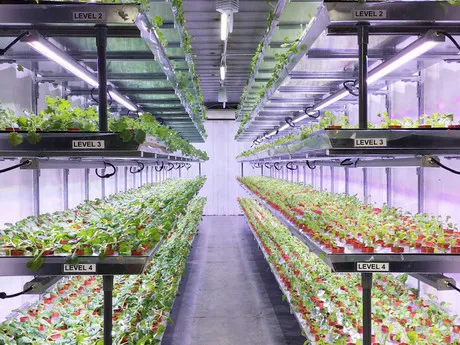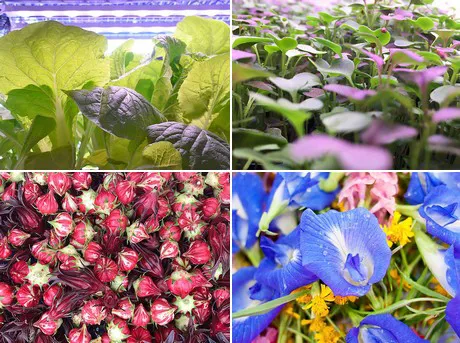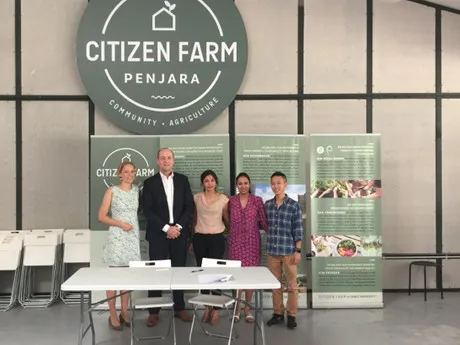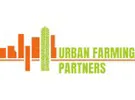In 2016, the Edible Garden City team discovered a dilapidated, abandoned former prison and decided to give it a new lease of life. 60 Jalan Penjara was not going to be just a regular farm, but rather, a collective of farmers sharing a vision of bringing community and agriculture together for Singaporeans. Thus, Citizen Farm was born: a closed-loop urban farming system that integrates natural systems with modern technology.
Darren Ho, Head of Citizen Farm, explains: "We studied and understood Singapore’s landscape and needs and we realised the problem was a bit deeper than just a lack of productivity. The disconnectedness between food and people, food value & appreciation and food waste were a few of the problems identified." Sticking to their principle of using as much of their own resources as possible, they turned to an insect. "Insects are in abundance and are an untapped resource. They are able to break down food wastes naturally in a short amount of time, and what is left is the compost for our crops, which we use for our farm."

In demand products
Citizen Farm sees a lot of demand for its products from restaurants. And, Darren says, they've also garnered quite a lot of interest from developers who are looking to integrate urban farms in their land planning as more are starting to see the value it provides. "It proves that people are intrinsically drawn to the ‘farm’ factor."
"Our microgreens system has been providing our bread and butter", Darren answers when asked what cultivation system he's most proud of. "It is relatively inexpensive to set up, we have found a sweet spot in each of our varieties' yield by playing around with the parameters, and that has been a huge hit with our chefs and consumers."

Dutch partnership
Fortunately, Darren and his team don't have to go it alone. "Horticulture is an extremely important part of our business, so we constantly have conversations with universities and specialised farmers who have experience in the industry. But we feel that the other components such as environmental parameters, lighting, etc. are equally important. That is why we have decided to integrate with the Dutch Consortium, Urban Farming Partners, to build a commercial farm for Singapore’s needs as we feel that the Dutch have deep knowledge and good track record in this industry."
In 2016, the Dutch government established a public-private partnership, called Urban Farming Partners. "The partnership is a way to help a group of Dutch knowledge and technology providers set up a farm, using their expertise, to offer solutions for global issues on a local scale, outside of the Netherlands", explains Nienke Gelderloos. She is Liaison Manager Urban Farming Partners and Policy Advisor Agriculture.

The cooperation with Citizen Farm is the first project for the partnership. Asked whether there's been a lot of interest in the Singapore project from Dutch companies, Nienke answers: "Definitely! Singapore recognizes food securities as one of its top priorities. The concepts presented by the Urban Farming Partners resonate with the ideas and vision Singapore has regarding its local food production and urban design. From both the public and private sector the consortium has had a lot of interest as well as concrete proposals for cooperation."
Singapore as a stepping stone
Nienke expects that urban farming will be more and more technologically advanced, integrated into the urban landscape, using and reusing resources, providing the increasing urban population with fresh and healthy foods. "Climate change, the desire to be increasingly self-sufficient, increasing urbanization, the opportunity urban farming offers to grow food locally that is flown in from overseas currently, congested city centers, possibilities to use and reuse side and waste streams from other facilities; the reasons are plenty."
And Singapore could serve as one of the blueprints in this quantum leap. Nienke: "As per country or destination the circumstances are different, every location will need its adaptations. For Singapore, we are now starting to understand all the local specifics. Whether it is the weather, the supply of energy and CO2, local regulations, it depends how easy it is. Other than that, we provide a solution to challenges not only Singapore faces."
Meanwhile, Darren and his team are looking to build up more Citizen Farms in the residential towns of Singapore, similar to the pilot farm at 60 Jalan Penjara. "We are continuously looking to innovate with integration so that we have end to end capabilities, which are important for such a nascent industry to thrive. We hope to groom more young farmers and entrepreneurs in the food scene to invigorate and shake up this unsustainable industry with viable solutions."
For more information:
 Citizen Farm
Citizen Farm60 Jalan Penjara, Singapore 149375
penjara@citizenfarm.com.sg
www.citizenfarm.com.sg
 Urban Farming Partners
Urban Farming Partnerswww.urbanfarmingpartners.com
